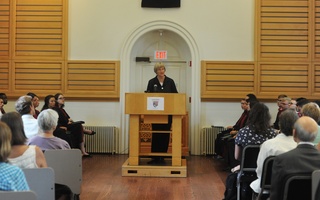While students have largely shrugged at Harvard’s announcement that it would rewrite the final lyric of its 181-year-old alma mater, University President Drew G. Faust said Friday she views the change as important to the University’s reexamination of its history.
Earlier this month, the Presidential Task Force for Inclusion and Belonging proposed changing the last line of “Fair Harvard,” which presently reads “Till the stock of the Puritans die.”
“This is a matter of symbols, which are both large and small in their importance,” Faust said. “I think it’s a first gesture from the committee, and one can say it’s just a line in the song—which it is—but on the other hand, we need, as an institution that has been around for a very long time, to ask ourselves those questions about some of our traditions.” {shortcode-bcdefc832a7e112d569e4973607ffe844f540df3}
She added, “As for the last line of ‘Fair Harvard,’ I’ve always been a little bit bewildered by what it meant, but I do have a certain sympathy with the notion that one’s alma mater should not end with the word ‘die.’”
The lyric change comes at a time when universities across the country have been forced to confront their oftentimes checkered histories. In February, Yale changed the name of Calhoun College, one of its residential colleges named after slavery advocate and statesman John C. Calhoun, and Princeton has had to contend with student activism surrounding former President Woodrow Wilson’s life and the role his legacy should play on campus.
Harvard has not been a stranger to debates surrounding naming and slavery. The University changed the title of House master to “Faculty Dean” in February 2016; Faculty of Arts and Sciences Dean Michael D. Smith wrote in an email announcing the change that “titles send a message.” And in March 2016, a Law School committee recommended the school get change its seal, which bore the crest of the slave-owning Royall family.
Yale administrators codified the institution’s response to renaming requests in a 24-page report written by the Committee to Establish Principles on Renaming. In an interview, Faust praised the “thoughtfulness” of the committee producing that report, but stopped short of saying that Harvard should also adopt such principles.
“I wouldn’t want to be constrained by a set of boxes to check, so I would just be wary of being too explicit for setting up the standards for evaluating a name, because I think often the circumstances might exceed or go beyond the specifics that have been anticipated,” Faust said. “So I’d like to make sure that these questions have sufficient attention to the uniqueness of any particular example.”
Faust also said she sees a need for more research about Harvard’s ties to slavery. In March, speaking at a Harvard conference on higher education and slavery, journalist Ta-Nehisi Coates advocated for universities to give monetary reparations; last year, the ambassador from Antigua and Barbuda wrote a letter to Faust calling on Harvard to offer preferential treatment in admissions to Antiguans, some of whom are descendants of slaves owned by the Royall family.
“I want a much fuller picture, and I want to understand how we fit within the picture of slavery in New England that has been so effectively elaborated by historians over the last 20 or 30 years, and also within the United States itself,” Faust said. “So I think I want to know more, but then I think we also have to figure out what does that mean our obligations to the future are?”
Paul Andrew, Harvard’s Vice President for Public Affairs and Communications, wrote in an email that the hiring process for a researcher dedicated to investigating the history of slavery at Harvard is “still ongoing.”
—Staff writer Claire E. Parker can be reached at claire.parker@thecrimson.com. Follow her on Twitter @ClaireParkerDC.
—Staff writer Leah S. Yared can be reached at leah.yared@thecrimson.com. Follow her on Twitter @Leah_Yared.
Read more in News
Sanctions May Be ‘Interim Step’ in Broader Effort, Faust SaysRecommended Articles
-
Royall Must LiveIf the Law school changed its crest, it would simply generate a “so what?” question. It would serve no political or symbolic good, while effectively exempting the need for any conversation on the subject.
-
 Faust Will Dedicate Plaque to Honor Harvard Slaves
Faust Will Dedicate Plaque to Honor Harvard Slaves -
 Mather House Examines Namesake's Past
Mather House Examines Namesake's Past -
 Faust Calls for Confronting the Past Ahead of New School Year
Faust Calls for Confronting the Past Ahead of New School Year -
Professors on Committee Examining Slavery Plan Conference“We need to engage this, not just to be better historians,” Beckert said of Harvard's ties to slavery. “We need to acknowledge this history as a way to be able to move forward.”













